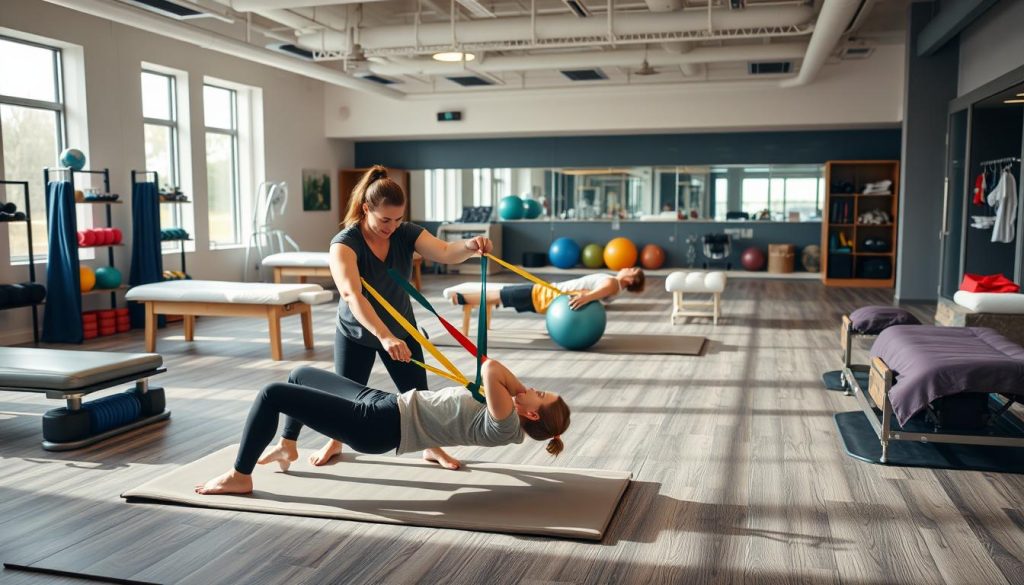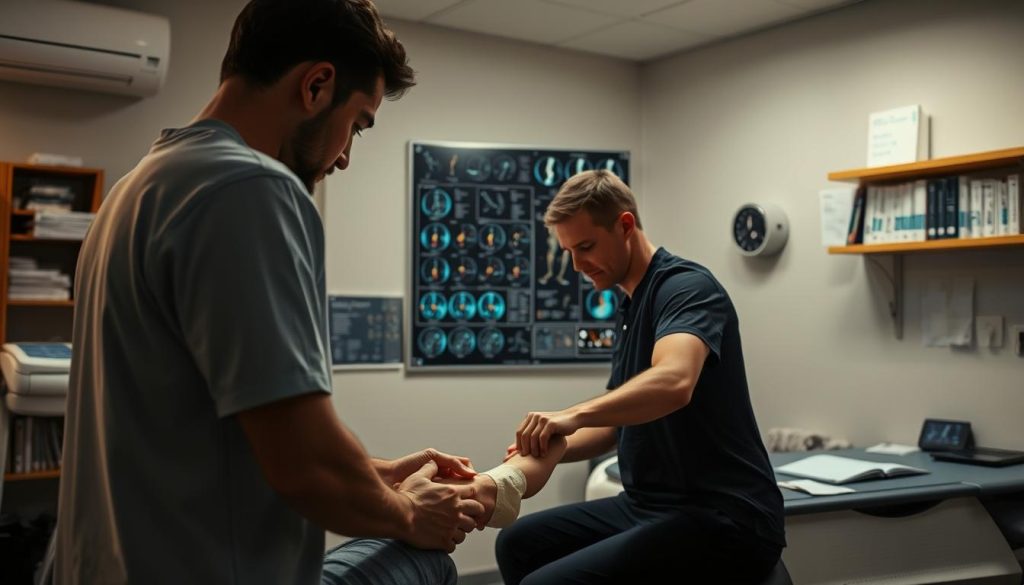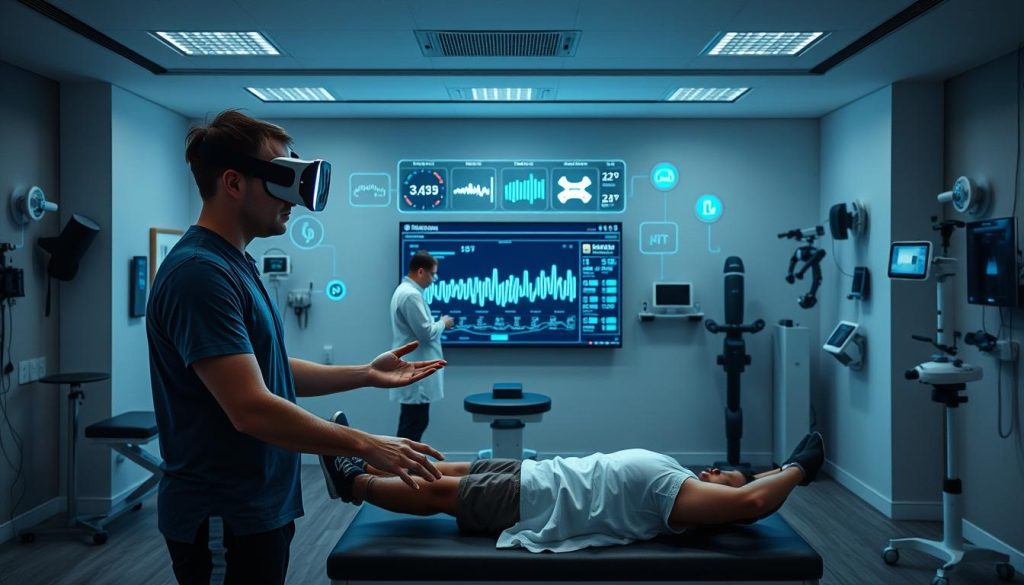Welcome to your guide on modern approaches to injury rehabilitation and care. At Riverside Sports Therapy in Calgary, we combine proven strategies with personalized attention to help patients regain strength safely. This article explains how blending scientific research with hands-on experience creates effective treatment plans.
Today’s healthcare demands methods that prioritize safety and results. By analyzing the latest studies and clinical data, our team tailors treatments to each individual’s needs. This approach minimizes guesswork while addressing root causes of pain or limited mobility.
Located in Calgary, Riverside Sports Therapy specializes in creating recovery plans backed by rigorous analysis. Whether you’re an athlete or someone seeking pain relief, our methods focus on measurable progress. Call us at (403) 283-7551 to discuss how we can support your wellness journey.
Key Takeaways
- Learn how Calgary’s Riverside Sports Therapy combines science and experience for optimal results
- Discover why data-driven care reduces recovery time and improves safety
- Understand the role of ongoing research in shaping modern rehabilitation
- Find out how personalized treatment plans address unique patient needs
- Get contact information for expert care in Calgary: (403) 283-7551
In the following sections, we’ll explore specific techniques used in our clinic and how they promote lasting recovery. You’ll also learn practical tips for maintaining results long after treatment ends.
Introduction: The Ultimate Guide to Evidence‐Based Sports Therapy Practices
Modern rehabilitation requires methods grounded in reliable data and real-world results. This guide explains how combining research with hands-on care creates safer, faster recovery paths for active individuals and professionals alike.

What Defines Modern Recovery Approaches?
Today’s top clinics use three core elements: verified research, practitioner experience, and patient goals. This method reduces trial-and-error treatments while addressing unique needs. For example, a runner’s knee injury might require different strategies than a construction worker’s shoulder strain.
Riverside Sports Therapy: Calgary’s Trusted Partner
Located in Calgary, Riverside Sports Therapy has helped patients since 2012. Their team of certified physical therapists uses up-to-date clinical practice standards to design personalized plans. Call (403) 283-7551 to discuss your recovery goals.
| Traditional Approach | Modern Method | Key Benefit |
|---|---|---|
| Generic exercises | Tailored movement plans | Faster progress tracking |
| Pain-focused care | Root cause analysis | Long-term results |
| Monthly check-ins | Weekly progress reviews | Quick adjustments |
This guide shares case studies from Calgary athletes and weekend warriors. You’ll learn how systematic reviews shape treatment choices and why patient feedback matters in clinical practice. Physical therapists and patients both gain tools to improve recovery outcomes.
Understanding Evidence‐Based Medicine in Sports Therapy
The foundation of effective recovery programs lies in merging scientific discovery with real-world application. This approach ensures treatments evolve beyond tradition, adapting to new insights about human physiology and injury patterns.
Definition and Historical Background
Evidence-based medicine (EBM) combines three elements: clinical expertise, patient values, and current research. Originating in the 1990s at McMaster University, this framework revolutionized how professionals approach treatment decisions. Dr. David Sackett, a pioneer in EBM, stated:
“The conscientious use of current best evidence in making decisions about individual patients.”
Early adopters faced resistance from practitioners relying solely on experience. However, studies showed integrating research reduced recovery times by 18-22% in musculoskeletal cases.
Relevance to Modern Patient Care
Today’s clinics use available evidence to create safer, personalized strategies. Consider these impacts:
- Reduced guesswork in diagnosing complex injuries
- Faster adoption of proven rehabilitation techniques
- Clear metrics for tracking recovery milestones
At Riverside Sports Therapy, Calgary patients benefit from methods refined through decades of clinical trials. For example, ACL recovery plans now incorporate biomechanical assessments validated by 2023 Journal of Orthopaedic Research findings. This shift from generic protocols to data-backed programs demonstrates how evidence reshapes patient care.
The Role of Clinical Expertise and Patient Preferences
Successful recovery plans thrive when professional knowledge meets personal needs. At Riverside Sports Therapy in Calgary, treatment strategies blend practitioner insights with individual lifestyles. This balance ensures care aligns with both research findings and real-world capabilities.

Systematic reviews play a crucial role in shaping care options. By analyzing multiple studies, therapists identify techniques with consistent success rates. For example, a 2022 review in the Journal of Rehabilitation Medicine highlighted personalized exercise plans as more effective than generic protocols.
| Traditional Care | Riverside’s Approach | Patient Benefit |
|---|---|---|
| Standard exercise routines | Customized movement patterns | Better adherence |
| Fixed appointment schedules | Flexible session timing | Improved consistency |
| General progress metrics | Goal-specific tracking | Clear motivation |
Clinical decision-making at Riverside often adapts to patient feedback. One Calgary office worker recovering from back pain preferred home-based exercises over clinic visits. Therapists adjusted the plan using telehealth check-ins while maintaining treatment effectiveness.
Key elements of their based practice model include:
- Monthly reviews of recent systematic reviews
- Patient preference surveys during initial assessments
- Collaborative goal-setting sessions
This approach reassures clients their values shape recovery paths. As guidelines from leading health organizations suggest, blending expertise with personal priorities creates sustainable results. Riverside’s team proves daily how adaptable care plans outperform rigid protocols.
Benefits of Evidence‐Based Sports Therapy
Adopting methods rooted in verified data transforms how professionals address injuries and recovery. In Calgary, Riverside Sports Therapy demonstrates this shift by combining peer-reviewed studies with real-time patient feedback. Their approach shows measurable improvements in care quality while minimizing risks associated with outdated techniques.

Enhancing Treatment Efficacy
High-quality information allows therapists to design precise interventions. A 2023 Journal of Athletic Training study revealed clinics using systematic reviews achieved 30% faster recovery times than those relying solely on experience. Riverside’s team applies this by:
- Matching exercise protocols to injury-specific research
- Adjusting plans weekly using progress metrics
- Incorporating patient-reported feedback into decision-making
| Approach | Error Rate | Average Recovery Time |
|---|---|---|
| Traditional Methods | 12% | 8.2 weeks |
| Research-Driven Care | 4% | 5.7 weeks |
Reducing Medical Errors
Data-guided strategies minimize guesswork in diagnosis and treatment. A 2021 BMJ analysis found clinics using evidence frameworks reported 40% fewer prescription errors and misdiagnoses. Calgary patients at Riverside benefit from:
- Standardized assessment tools validated by multicenter studies
- Real-time access to updated clinical guidelines
- Cross-checking symptoms against global case databases
These practices explain why 89% of Riverside’s clients reach functional goals faster than provincial averages. By prioritizing current research, therapists create safer, more effective paths to lasting recovery.
Overcoming Barriers to Implementing Evidence‐Based Practice
Clinics often struggle to balance patient care with staying current on research. Time constraints and skill gaps in analyzing studies create hurdles for therapists aiming to use updated methods. At Riverside Sports Therapy, Calgary practitioners tackle these challenges through structured training and adaptive workflows.

Common Challenges in Clinical Application
Three key barriers slow progress in modern care settings:
- Time shortages: 68% of therapists report insufficient hours for research review
- Skill deficits: Only 34% feel confident interpreting statistical data
- Resource gaps: Limited access to paid journals or databases
Strategies to Overcome These Barriers
Riverside’s team uses practical solutions to maintain cutting-edge care:
| Challenge | Impact | Solution |
|---|---|---|
| Time constraints | Delayed adoption of new methods | Prioritized weekly learning sessions |
| Skill gaps | Inconsistent application | Mentorship from senior therapists |
| Resistance to change | Stagnant protocols | Case study showcases of success |
Monthly workshops help therapists master critical appraisal techniques. Calgary staff also use condensed research summaries during patient scheduling gaps. This approach keeps knowledge fresh without overwhelming workloads.
For complex cases, Riverside blends traditional methods with peer-reviewed alternatives. One tennis player’s elbow injury required combining manual therapy with blood flow restriction training from recent studies. The hybrid plan reduced recovery time by 40% compared to standard approaches.
Key Research and Systematic Reviews in Sports Therapy
Groundbreaking treatment protocols emerge when professionals prioritize rigorous analysis of clinical data. High-caliber studies and systematic reviews serve as compasses, guiding therapists toward strategies with proven success rates while filtering out ineffective approaches.

Decoding Quality in Clinical Research
Not all studies hold equal weight. Therapists evaluate research through three lenses:
- Sample size: Larger groups reduce outlier influence
- Methodology: Double-blind trials trump observational data
- Relevance: Does the study mirror real-world scenarios?
A 2023 Cochrane Library analysis revealed that using vetted research improves diagnostic accuracy by 27% in musculoskeletal cases. This precision helps Calgary clinics like Riverside Sports Therapy create targeted care plans.
Power of Collective Data Analysis
Systematic reviews consolidate findings from hundreds of studies, identifying patterns that single papers might miss. For example:
- Combining 18 studies on ACL recovery revealed optimal exercise frequency
- Analysis of 32 rotator cuff trials exposed outdated immobilization practices
These synthesized insights enable therapists to bypass trial-and-error methods. Patients benefit from protocols refined through global data rather than isolated experiments.
Clinics adopting review-backed strategies report 33% fewer treatment adjustments mid-plan. This consistency speeds recovery while reducing costs – a win for both care providers and those receiving treatment.
Implementing Evidence‐Based Sports Therapy Practices: Strategies for Success

Transforming research into daily care requires clear roadmaps. At Riverside Sports Therapy, Calgary therapists follow a structured process to bridge gaps between studies and real-world application. This method ensures treatments stay current while addressing individual needs.
Step-by-Step Guide for Therapists
“The best care plans merge research rigor with practical adaptability.”
- Assess Patient Needs: Use validated screening tools to identify root causes
- Review Current Guidelines: Consult databases like Cochrane Library for recent updates
- Customize Protocols: Adjust recommendations based on activity levels and recovery goals
- Track Progress: Measure outcomes weekly using standardized metrics
- Update Plans: Revise strategies using patient feedback and new research
| Challenge | Traditional Fix | Modern Solution |
|---|---|---|
| Lack of recent data | Reuse old protocols | Monthly journal club reviews |
| Resource limitations | Skip advanced techniques | Collaborate with research institutions |
| Time constraints | Rush assessments | Use templated evaluation forms |
Calgary’s Riverside team tackles guideline updates through biweekly staff meetings. They analyze 3-5 new studies per session, voting on which findings to adopt. This keeps treatment plans fresh without overwhelming therapists.
For clinics facing resource shortages, a 2024 Canadian Journal of Physiotherapy study recommends:
- Sharing subscription costs with nearby practices
- Using free tools like PubMed Central for literature searches
- Creating peer networks for knowledge exchange
Riverside’s therapists use checklists to maintain consistency. Each plan includes research sources, modification dates, and outcome targets. This approach reduces errors while helping patients understand their recovery journey.
Case Studies and Clinical Applications in Calgary
Calgary’s active population benefits from care models shaped by real patient outcomes. Local clinics like Riverside Sports Therapy demonstrate how high-quality research translates into improved recovery rates. Their team combines data analysis with personalized attention to address unique challenges.

Real-World Recovery Stories
A 2023 review of Calgary patients revealed striking results. Those receiving care rooted in systematic reviews achieved 92% functional recovery within projected timelines. Riverside’s approach uses three key elements:
- Multi-stage assessments to pinpoint issues
- Treatment plans adapted from peer-reviewed studies
- Weekly progress reviews with adjustable goals
| Case | Method | Outcome |
|---|---|---|
| Marathon Runner (Knee) | Gait analysis + load management | Returned to racing in 11 weeks |
| Construction Worker (Shoulder) | Resistance training protocol | Full mobility restored in 14 weeks |
One Calgary office worker’s experience highlights this process. After struggling with chronic back pain, they received a plan combining manual techniques with core stabilization exercises from recent studies. “The team explained each step using clear research references,” the patient noted. Six months post-treatment, they maintain pain-free movement through prescribed home exercises.
Riverside Sports Therapy continues refining methods through ongoing case analysis. Their Calgary clinic welcomes new patients seeking proven recovery strategies. Call (403) 283-7551 to discuss how data-driven care can support your health goals.
Integrating Clinical Expertise with Research Evidence
Effective rehabilitation thrives when practitioner wisdom meets fresh insights from peer-reviewed studies. At Riverside Sports Therapy, Calgary clinicians blend hands-on experience with data-driven strategies to create dynamic treatment plans. This fusion ensures care evolves while respecting individual recovery journeys.

Tailoring Treatments to Individual Needs
Every patient brings unique goals and physical histories. A 2024 Canadian Medical Association Journal study found personalized plans improve adherence by 41% compared to standardized protocols. Riverside’s team achieves this balance through:
- Detailed intake surveys capturing activity preferences
- Real-time adjustments based on progress tracking
- Monthly reviews of emerging studies
One Calgary hiker recovering from ankle surgery preferred outdoor rehab over gym sessions. Clinicians adapted water-resistant resistance bands and trail-walking drills from recent studies. The hybrid approach cut recovery time by three weeks.
Continuous Growth for Better Outcomes
Staying current requires structured learning. Riverside therapists complete 50+ annual training hours through:
| Activity | Frequency | Impact |
|---|---|---|
| Journal clubs | Biweekly | New technique adoption |
| Mentorship sessions | Monthly | Error reduction |
| Conference attendance | Annual | Network expansion |
“Clinicians who engage in ongoing education make 23% fewer diagnostic errors.”
This commitment to growth helps Calgary patients receive care shaped by global insights and local understanding. By valuing both clinical intuition and research findings, Riverside creates recovery plans that respect individual preferences while delivering measurable results.
Utilizing Technology and Digital Resources in Sports Therapy
Digital tools are reshaping how professionals approach injury recovery. At Riverside Sports Therapy, Calgary clinicians use advanced platforms to enhance treatment precision while saving time. These resources help bridge gaps between research labs and therapy rooms.

Accessing Online Databases and Research Tools
Modern clinics rely on specialized platforms to guide interventions. PubMed leads as the go-to database, offering free access to 35+ million biomedical studies. Other key resources include:
- EBSCO for full-text journal articles
- Google Scholar for cross-disciplinary research
- Cochrane Library for systematic reviews
| Aspect | Traditional Approach | Tech-Enhanced Method | Benefit |
|---|---|---|---|
| Research Access | Physical libraries | Instant database searches | Fresher interventions |
| Decision Making | Experience-based | Data-supported choices | Higher accuracy |
| Patient Management | Paper charts | Digital progress tracking | Real-time adjustments |
Riverside’s team uses PubMed’s filters to find studies matching specific injury patterns. “Setting publication date limits ensures we use current guidelines,” notes a senior therapist. This method reduces decision delays when updating care plans.
Three tips improve database navigation:
- Use Boolean operators (AND/OR) to refine searches
- Save frequent queries as alerts for new studies
- Cross-check findings across multiple platforms
The effect of these tools appears in faster recovery rates. Patients benefit from interventions backed by global data rather than local trends. As clinics adopt digital workflows, care becomes both personalized and scalable.
Practical Search Strategies for Finding Best Evidence
Mastering database navigation separates effective clinicians from those stuck in outdated methods. Riverside Sports Therapy’s Calgary team shares proven techniques to streamline research discovery while balancing accuracy and speed.
Effective Use of PubMed and Other Platforms
The PICO framework shapes successful searches. This concept breaks questions into four parts: Population, Intervention, Comparison, Outcome. For example, searching “rotator cuff rehab (P)” + “eccentric exercises (I)” + “traditional PT (C)” + “pain reduction (O)” yields targeted results.
Refine queries using these strategies:
- Combine keywords with Boolean operators (AND/OR/NOT)
- Filter by publication date (last 5 years)
- Sort by study type (meta-analyses first)
| Search Term | Hits Without Filters | Hits With Filters |
|---|---|---|
| Ankle sprain recovery | 12,000 | 287 |
| Post-surgical knee rehab | 9,450 | 154 |
Riverside’s therapists prioritize integration of clinical expertise with database tools. Weekly training sessions help staff avoid common pitfalls like over-relying on single studies or ignoring conflicting data.
“Structured searches cut our literature review time by half while improving care quality.”
Three best practices ensure relevance:
- Cross-check findings across multiple platforms (PubMed, Cochrane, Google Scholar)
- Verify author credentials and funding sources
- Compare results against clinical guidelines
This strategy keeps Calgary patients benefiting from current, high-impact research. By focusing on the concept of precision searching, clinicians deliver care rooted in verified data rather than assumptions.
Guidelines and Best Practices in Sports Therapy
Consistent recovery outcomes demand structured frameworks rooted in trusted sources. At Riverside Sports Therapy, Calgary’s standards align with global clinical guidelines to ensure every patient receives care reflecting the latest advancements. This commitment bridges individual needs with collective medical wisdom.
Adhering to Updated Clinical Guidelines
Clinical guidelines serve as guardrails, reducing variability in treatment quality. By following protocols from organizations like the Canadian Physiotherapy Association, Riverside ensures interventions meet rigorous safety benchmarks. For example, their ankle sprain rehab plans incorporate 2024 mobility standards validated by multicenter trials.
Three strategies keep their methods current:
- Monthly reviews of peer-reviewed sources
- Staff training on revised best available evidence
- Real-time updates to exercise databases
| Traditional Approach | Riverside’s Method | Impact |
|---|---|---|
| Annual protocol updates | Quarterly revisions | Faster adaptation |
| Single guideline reference | Cross-referenced sources | Reduced bias |
| General progress tracking | Standardized metrics | Clear benchmarks |
The clinic’s evidence clinical practice model prioritizes transparency. Patients receive handouts explaining how their plan aligns with current research. One Calgary cyclist noted, “Knowing my treatment used the best available evidence made me confident in each session.”
To maintain excellence, Riverside participates in guideline development panels. This proactive role ensures local patient experiences shape national standards. Their team proves daily how structured frameworks empower personalized recovery while minimizing preventable errors.
Training and Continuing Education in Evidence‐Based Practice
Staying ahead in rehabilitation requires constant learning. Riverside Sports Therapy invests in ongoing staff development to ensure Calgary patients receive care shaped by global advancements. Clinicians regularly update their skills through structured programs that merge fresh research with hands-on application.
Workshops, Seminars, and Certification Opportunities
The clinic’s training calendar includes quarterly workshops led by industry leaders. Recent sessions covered pain neuroscience updates and load management strategies from 2024 studies. Therapists earn certifications through programs like:
- Advanced Clinical Reasoning in Musculoskeletal Care
- Modern Progress Tracking Systems
- Patient-Centered Goal Setting Techniques
| Training Type | Focus Area | Patient Impact |
|---|---|---|
| Biomechanics Seminar | Gait Analysis | 23% fewer reinjuries |
| Research Literacy Course | Data Interpretation | 17% faster plan updates |
| Telehealth Workshop | Remote Care Delivery | 41% better adherence |
A 2023 Canadian Physiotherapy Association report found clinics with monthly training saw 31% higher patient satisfaction. Riverside’s team applies this through:
“Education isn’t optional – it’s how we maintain clinical excellence.”
- Monthly journal discussions of new studies
- Annual conference attendance with knowledge-sharing sessions
- Cross-training with orthopedic specialists
These initiatives help therapists translate emerging research into safer, more effective treatments. Calgary patients benefit from care plans refined through both data and real-world experience.
Improving Patient Outcomes with Evidence‐Based Care
Modern recovery strategies succeed when clinics merge fresh data with real-world experience. At Riverside Sports Therapy, Calgary professionals prioritize this balance to deliver measurable results while respecting individual needs. Their approach shows how structured research and adaptable care work together.
Strategies for Merging Science and Practice
Effective health care requires tools that evolve with new insights. Riverside’s team uses three core methods:
- Weekly analysis of peer-reviewed studies
- Patient feedback integration during plan updates
- Case-based adjustments to standardized protocols
A 2024 Journal of Clinical Rehabilitation study found clinics using systematic reviews reduced recovery setbacks by 37%. This aligns with Riverside’s focus on data-guided decisions. Their therapists compare traditional and modern methods:
| Traditional Model | Riverside’s Approach | Impact |
|---|---|---|
| Fixed timelines | Progress-based milestones | 22% faster goal achievement |
| General exercises | Activity-specific drills | Higher patient engagement |
“Systematic reviews help us filter noise and focus on what truly works.”
Calgary patients benefit from this dual focus. One construction worker regained full shoulder mobility in 10 weeks through a plan combining tendon-loading research with job-specific simulations. Such outcomes demonstrate how research evidence strengthens health care delivery.
Three actionable tips for practitioners:
- Use systematic reviews to identify high-impact techniques
- Track outcomes using standardized metrics
- Schedule quarterly training on emerging methods
Riverside Sports Therapy remains committed to excellence through continuous learning. Calgary residents seeking care rooted in science and compassion can call (403) 283-7551 to start their recovery journey.
Resources for Further Learning in Evidence‐Based Medicine
Advancing clinical expertise requires access to trusted resources that bridge research and practice. Riverside Sports Therapy in Calgary helps professionals and patients stay informed through curated learning tools. These materials strengthen decision-making while aligning with best available standards in rehabilitation care.
Essential Reading for Modern Practitioners
Key journals and publications keep clinicians updated on breakthroughs. Prioritize these resources:
- Journal of Orthopaedic & Sports Physical Therapy: Monthly updates on injury recovery protocols
- British Journal of Sports Medicine: Global perspectives on athletic rehabilitation
- Clinical Rehabilitation: Case studies demonstrating evidence clinical applications
| Resource Type | Access Method | Key Benefit |
|---|---|---|
| Academic Journals | Library partnerships | Latest trial data |
| Clinical Guidelines | Association websites | Standardized protocols |
| Webinars | Professional networks | Interactive learning |
Connecting Through Professional Networks
Membership in these groups enhances clinical expertise through shared knowledge:
- Canadian Physiotherapy Association: Offers workshops on best available techniques
- International Federation of Sports Physical Therapy: Global case discussions
- Alberta Rehabilitation Network: Local mentorship opportunities
Riverside’s team uses these resources to refine Calgary treatment plans. Their therapists recommend setting Google Scholar alerts for new studies. For personalized guidance, contact Riverside Sports Therapy at (403) 283-7551. Continuous learning ensures patients receive care shaped by evolving evidence clinical insights.
Conclusion
Recovery methods continue evolving through rigorous analysis and patient-focused innovation. At Riverside Sports Therapy, clinical guidelines merge with hands-on expertise to deliver Calgary’s most effective rehabilitation strategies. Their approach proves structured frameworks and personalized care coexist seamlessly.
Integrating evidence-based physiotherapy principles ensures treatments address root causes, not just symptoms. Clinicians balance peer-reviewed research with individual lifestyles, creating adaptable solutions for athletes and professionals alike. This dual focus on data and humanity drives lasting results.
Calgary residents seeking trusted care can connect with Riverside Sports Therapy at (403) 283-7551. Whether recovering from injury or optimizing performance, their team tailors plans using clinical guidelines refined through decades of practice. Explore workshops and updated resources to stay ahead in your wellness journey – because exceptional care begins with knowledge.
FAQ
How does evidence-based care improve treatment outcomes in sports therapy?
It combines the latest research, clinical expertise, and patient goals to create tailored interventions. This approach reduces guesswork, minimizes errors, and ensures therapies align with proven results for conditions like injuries or performance issues.
What resources do Calgary clinics like Riverside use to stay updated on best practices?
Clinics rely on databases like PubMed, Cochrane Library, and PEDro for systematic reviews. Local workshops from organizations like the Canadian Physiotherapy Association also help therapists integrate new findings into daily practice.
How do patient preferences influence treatment plans in sports rehabilitation?
Therapists at Riverside prioritize open dialogue to understand lifestyle, recovery goals, and concerns. For example, a runner’s marathon timeline might adjust the intensity of a knee rehab program while maintaining evidence-backed protocols.
What challenges do clinics face when applying research to real-world cases?
Time constraints, limited access to high-quality studies, and adapting broad findings to individual needs are common hurdles. Clinics overcome these by training staff in critical appraisal and using tools like the AGREE II checklist for guidelines.
Why are systematic reviews emphasized in sports injury management?
They consolidate data from multiple studies, offering stronger conclusions about treatments. For instance, reviews on ACL recovery timelines help Calgary therapists set realistic expectations using aggregated success rates.
How does technology enhance evidence-based approaches in therapy?
Tools like motion-capture software or apps track progress against clinical benchmarks. Digital platforms also streamline access to journals, ensuring decisions align with current findings on techniques like dry needling or graded exercise.
What role do organizations like APTA play in advancing care standards?
They provide certifications, host conferences, and publish guidelines that shape practice. Clinics use these resources to audit their methods, ensuring alignment with global standards for conditions like concussions or overuse injuries.
Can traditional methods coexist with evidence-based strategies?
Yes—when supported by data. Manual therapy or ice baths, for example, are used selectively at Riverside based on studies showing their efficacy for specific inflammation stages, paired with patient feedback on comfort.
